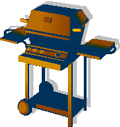While propane barbecues are cleaner and cook faster than charcoal barbecues, they do present potential hazards. A little extra care along with these simple precautions should ensure the safe and enjoyable operation of your propane barbecue.
- Make sure burner ports are free of rust and dirt.
- Ensure that the burner orifice is clear of dust and cobwebs.
- Check that the hose is in good condition. A damaged or cracked hose can send out a jet of propane which could result in a flame several feet high if ignited.

- Do not operate a barbecue within ten feet of a combustible wall or window of a building.
- When lighting your barbecue, have the match or taper already burning and the lid open before you turn on the propane.
- Never move the barbecue while it is lit.
- Turn off both the appliance "on-off" valve and the cylinder valve at the conclusion of every use.
Always be sure to check your barbecue for leaks before you use it. Follow these easy steps:
- Turn barbecue burner control knobs off.
- Move the barbecue to an open, well-ventilated outdoor area prior to connecting the fuel supply.
- Connect the fuel supply to the barbecue and check all connections for leaks. Do not use matches, lighters, or flame to check for leaks.
- A simple way to check for leaks can be adding a small amount of dishsoap to water in a spray bottle. Spray over the area of the suspected leak. A leak is imminent if bubbles surface on the sprayed area.
- If you find a leak, close the cylinder service valve and re-tighten the leaking connection. Leak test again.
- If you cannot stop a leak by additional tightening of a connection, turn off the propane cylinder service valve. Disconnect the propane cylinder and call a fuel appliance repair-person certified through Technical Standards & Safety Authority (TSSA).